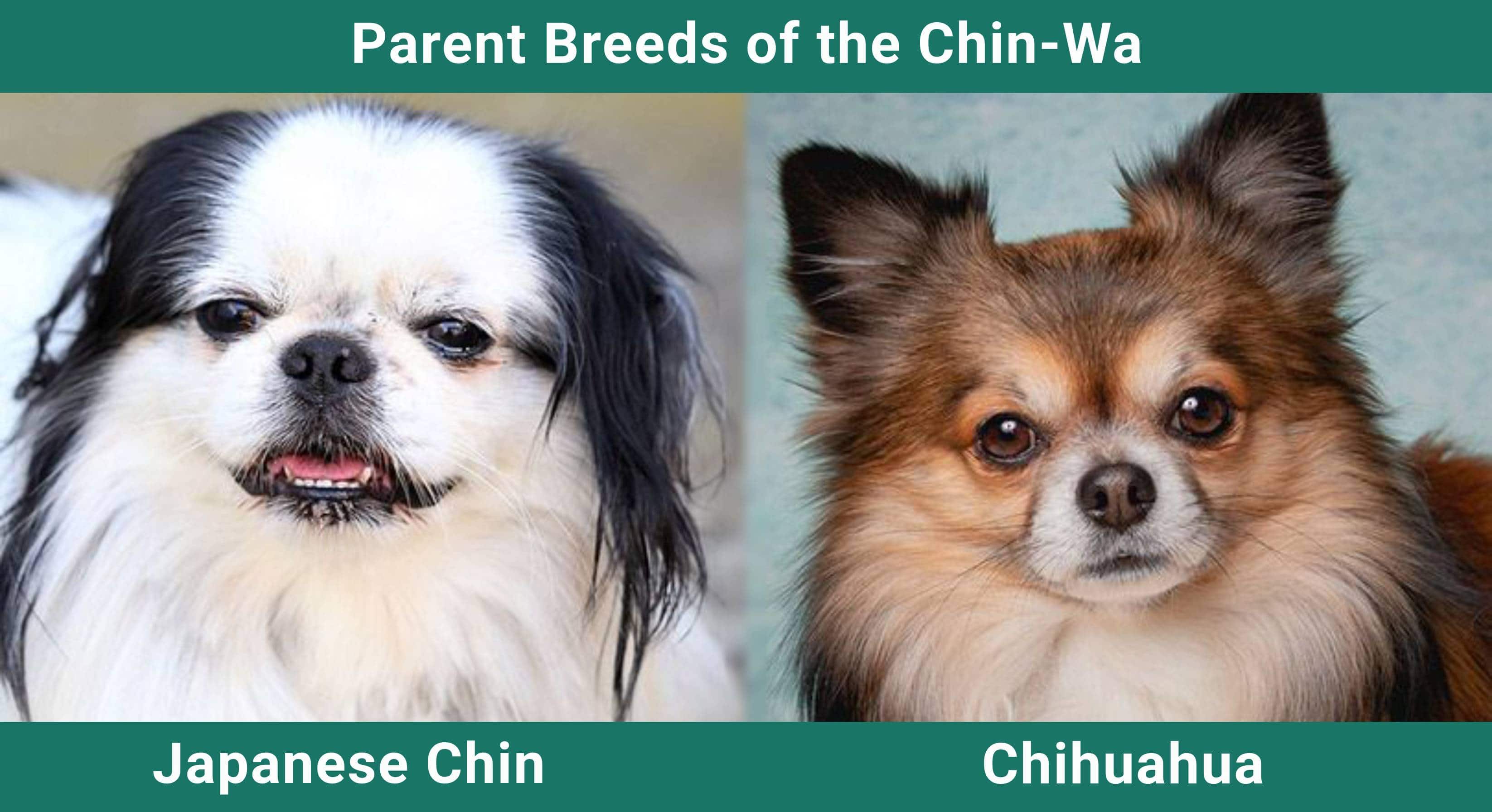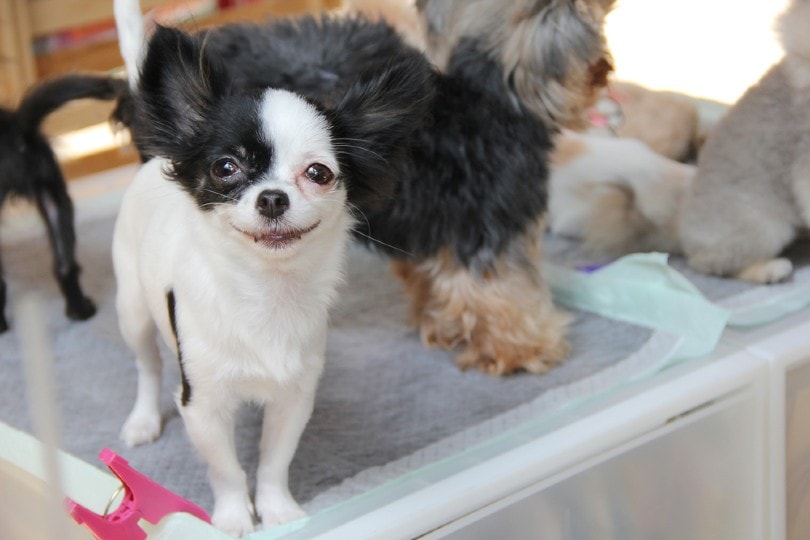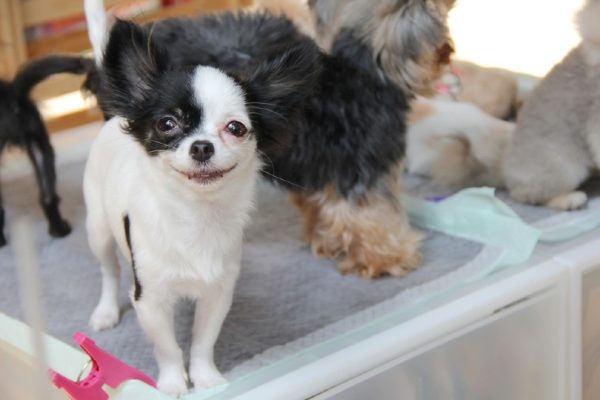Click Below to Skip Ahead
The Chin-Wa is a cross between a Japanese Chin and the Chihuahua. Also known as the Chi-Chin, this dog breed is a small-sized dog just like its parents. This dog brings together the friendliness of the Japanese Chin and the sassy personality of the Chihuahua to make a fantastic little companion dog.
These designer dogs are very social and love being around people. They require minimal exercise and are an excellent choice for apartment dwellers. However, they like to play and can be very stubborn during training like the Chihuahua parent.
Breed Overview
Height:
10 – 11 inches
Weight:
4 – 8 pounds
Lifespan:
10 – 12 years
Colors:
White, black, cream, red, brown
Suitable for:
Families with children, experienced dog owners, apartment living, and those seeking watchdogs
Temperament:
Playful, happy, affectionate, and vocal
The Chin-Wa has a variety of coat colors and patterns. The fur coat is always straight; however, the hair can either be short or long. Because of this, they are very low-maintenance when it comes to grooming.
Chin-Wa Characteristics

Origins
A product of two purebred parents, this breed is a smaller version of the parents. The Chihuahua origin is in Mexico and is the smallest dog breed. As its popularity grew, it got registered by the American Kennel Club (AKC) in 1904. The brave and confident is one of the most famous dog breeds.
On the other hand, the Japanese Chin originated from China before ending up in Japan. The Chin then spread out to other parts of the world, such as the U.S. and the U.K. The AKC officially recognized it in 1888.
Breeders brought the two together to create the Chin-Wa breed. As a designer dog, the Chin-Wa does not qualify to be a member of the AKC. This breed picks some features and personalities from both parents and makes an excellent pet.
Chin-Wa Puppies
Hybrids such as the Chin-Wa are less costly than purebreds. Although their parents, the Chihuahuas and Japanese Chin, are popular, this breed is relatively cheaper.
Before buying one of these breeds, you can estimate the costs by looking at the breeder’s reputation and the parent’s pedigree. Breeders who follow the proper procedures produce quality and healthy puppies. Because of these breeding practices, they have a better reputation and will charge more for the pups.
You can request to visit the breeder’s location as well as for the health records of the puppy. This information will give you a clear picture of how they operate.
To avoid getting a sickly puppy, ensure you don’t buy one from backyard breeders or puppy mills. Although they sell their dogs at a much lower price, they are more likely to get you into more expenses.

Temperament & Intelligence of the Chin-Wa
The Chin-Wa is a people dog that enjoys being at the center of the action. This dog breed inherits some traits from its parents; therefore, it can be feisty with a big personality. It’s a clever little dog that is always alert in the presence of strangers, just like its parents. Because of this, it makes an excellent watchdog.
This dog enjoys performing tricks it has learned; therefore, will find time to impress their caretakers by performing what they have learned. To keep them engaged, they need both physical and mental stimulation.
Once you get this dog, they become pretty attached to the family and love to hang out together all the time. The downside to this is that they can develop separation anxiety when left alone for too long.
Due to their Chihuahua background, these dogs can be pretty stubborn. However, some adopt the friendliness of the Japanese Chin.
Are These Dogs Good for Families?
If you have kids, this dog is a perfect fit. However, these dogs prefer living with older children because they better understand how to treat them. In addition, because of their size, it’s best to avoid leaving the dog with tiny children without supervision.
If the child annoys the dog, it will most likely lash out. With proper socialization, the dog will get along with the entire family with no problem.
Does This Breed Get Along with Other Pets?
Chin-Wa dog breeds love getting all the attention from the family. Because of this, they prefer to be the only dog in the family. This is a common trait in the parent breed, the Chihuahua.
If you are planning to bring in other pets, you have to first try and socialize your Chin-Wa. These dog breeds are very territorial and don’t adapt well to new pets in the household. They exhibit these traits because they don’t want to share their space with any other dog breed.
If you have other pets, such as cats or birds, proper socialization is essential. Otherwise, your dog will feel left out if they feel like they are not getting enough attention.
Things to Know When Owning a Chin-Wa
Taking care of any pet involves understanding all the requirements they need to be comfortable. Once you know their behavior pattern and temperaments, you can provide the necessities they need. Before you bring your Chin-Wa home, you need to know everything about the food and nutrition, exercise and training needs, grooming, and medical conditions.
Food & Diet Requirements
This dog breed is moderately active. As a tiny dog, it needs to eat a small amount of food to avoid weight issues.
When planning the diet for your dog, you should only feed them high-quality food according to age and activity level. If you don’t know the exact amount, you can talk to the vet to provide precise measurements.
The metabolism of Chin-Wa tends to be slower because it doesn’t need a lot of activity. In addition, they also don’t have a high appetite.
Every day, you can feed your pup approximately 1 cup of food. Owners should space the meals throughout the day to prevent the dog from getting fussy.
The diet should include a mix of dry kibble, human food, and treats. However, ensure you don’t overdo the treats; otherwise, the dog might not eat the kibble.
The low activity levels can be a disadvantage for this dog breed. If you are not careful with the food, they can add weight quickly since they rarely have a chance to burn it off. When this happens, your dog might start developing joint and muscle problems.
Exercise
Your Chin-Wa doesn’t need a lot of exercise to be happy and healthy. However, if you don’t take the dog for regular walks, it can easily get bored and start barking a lot.
Always ensure the dog is on a leash during the walks because they can be very stubborn. These walks are also good for the socialization process. If they see other dogs, they might adapt better to a new dog in the home.
On top of outdoor exercises, you can add some indoor play sessions. The low activity needs are perfect for people living in apartments.
As long as you have plenty of toys, the dog will be engaged and stay happy. Their little legs tire out quickly, and after a short period, so you won’t need to plan for rigorous activities.
Thirty minutes a day is enough for a Chin-Wa for physical stimulation.
Training
The Chihuahua background makes the Chin-Wa stubborn. This makes it very difficult to train, especially when these traits are the dominant side. Once they lose concentration during training, it becomes hard to get them back on it once again.
Despite being pretty intelligent, they can become frustrating to the owners when they refuse to obey commands. When engaging in these sessions, you need patience and consistency for your dog to get all the orders.
Because they are smart enough, they’ll train much quicker if you engage a trainer. Keep in mind that this service will cost you money.
When training the dog at home by yourself, you can use positive reinforcement such as rewards and treats when they respond well. When they get rewarded, they’ll be more likely to take up instructions because they love pleasing people. As the owner, ensure you establish your authority so that your puppy can follow your commands.
If you have more people in the family, liaise together and have the same training commands. This way, the pet doesn’t get confused and can keep up easily.
Grooming ✂️
Chin-Wa dog breeds come in varying colors from brown, red, cream, black, white, to grey. The fur coats can either be long and straight or short.
Breeds with the longer coat exhibit feature from the Japanese Chin, while the shorter ones look like the Chihuahua parent. Short-coated ones are low-maintenance; they only need to be brushed three times a week. However, for breeds with longer coats, you can brush it daily to avoid tangles.
Because of this coat, they are considered a moderate shedder, and therefore, will need brushing two to three times every week. Just like both parents, this breed is also not hypoallergenic. Consequently, it’s not very ideal for people with allergies.
You can change up the type of brush you use depending on the type of coat your pet has. Alternate between a pin brush and a slicker brush depending on what will be most effective to your dog’s texture.
Apart from the coat, these small dogs are also prone to dental issues. To protect your pup, brush its teeth at least twice a week and include this as a routine grooming regimen. In addition, trim the nails when they overgrow.
Chin-Wa breeds can have either floppy or erect ears. If yours has floppy ears, ensure you clean them at least once a week to remove any debris and check for infections. This is the only way to protect your pet from severe problems.
Health and Conditions
Designer dogs are bred to improve the quality and eliminate some of the health issues found in purebred parents. However, despite this breeding, the hybrid can still inherit some of the medical conditions.
Before adopting or buying a Chin-Wa, it’s advisable to get medical records of the parents to know what diseases your dog is prone to. With this background, you’ll be more prepared for what to expect.
Here are some of the medical conditions your Chin-Wa could get, some severe and some minor.
- Eye Cataracts
- Allergies
- Shivering
- Dental Issues
- Ear Problems
- Patellar Luxation
- Tracheal Collapse
- Heart Murmurs
- Liver Shunts
Serious Conditions
These are severe health problems that can become fatal if left untreated.
Patellar Luxation
Small breeds like the Chin-Wa are more prone to patellar luxation. This condition occurs when the dog’s kneecap shifts out of alignment.
Depending on the severity, it can appear in one, or both, of the hind legs. Patella luxation stems from a traumatic injury or an abnormality with the joint or limb structure.
Tracheal Collapse
A collapsed trachea is common in Chihuahuas; therefore, dogs from this parent breed are more likely to inherit this condition. This issue is common in middle-aged dogs.
The trachea in your Chin-Wa may collapse due to their not having enough cellular rings of cartilage. Once this happens, your dog will start coughing, wheezing, have difficulty breathing, and vomiting. Since it’s mostly inherited, your breeder should let you know whether your puppy is highly prone to this medical condition.
Heart Murmurs
Chin-Wa dog breeds develop heart problems that exhibit themselves in various ways. The pup might have heart disease or even congestive heart failure.
To protect your dog from fatality, you can detect these problems early by carefully monitoring your pup’s health. Immediately you notice any issues, you should alert your vet to start treatment.
Liver Shunts
Once your dog’s liver gets this infection, the body processes will not be functioning effectively. Liver disorders can quickly turn fatal if not treated as soon as possible. Have the vet conduct regular blood tests during the visits to keep your pet safe.
Minor Conditions
The veterinarian can treat minor health problems much faster. Let’s take a look at some of them.
Eye Cataracts
Like other dogs, Chin-Wa breeds are prone to eye infections. These can range from cataracts, eye infections, retinal atrophy that can eventually lead to blindness. Closely monitor your pet to protect them from going blind.
Allergies
When there’s too much pollen, the Chin-Wa gets affected by allergies. Since they require moderate exercise, you can keep them indoors for play sessions to protect them from allergic reactions.
Shivering
Your dog may involuntarily experience shivering. This also happens when it gets exposed to extremely cold weather.
If you notice your dog is shivering a lot, you should keep them warm. Otherwise, they may start developing breathing problems, start coughing or wheezing.
Dental Issues
Like other dogs, if you don’t brush this dog’s teeth frequently, it will develop dental problems. You can curb these infections by ensuring dental care is part of the weekly grooming session.
Ear Problems
Dogs with floppy ears are at a higher risk of ear infections. Ear mites find spaces to hide in these types of ears. If you don’t regularly clean the ears or check for infection, your pup might go deaf in the long run.
Male vs. Female
With small dogs such as the Chin-Wa, the differences between the male and female are minimal. They have similar sizes and have the same personalities. However, you might notice a difference in the temperament according to the specific dog.
These dogs require neutering or spaying. The procedure tends to be more costly for the female than in males. Therefore, as you get the new pup, ensure you budget for the extra surgery costs.

3 Little-Known Facts about the Chin-Wa
Here are some facts about this parent’s breeds that you should know.
1. AKC Recognized the Japanese Chin Before the Chihuahua
Despite not being recognized by the AKC, the Chin-Wa’s parents are officially listed. When comparing the two parents, the Chihuahua is more famous; however, it was recognized much later.
The Japanese Chin originated from the Chinese imperial courts and was highly valued as a gift to visitors. This dog then made its way to Japan and was bred with other small native dogs. It was not until the 1800s that it crossed over to the U.S. and the U.K.
Matthew C. Perry was one of the people who gifted this dog after establishing trading posts in Japan. Years later, August Belmont, Jr., a relative of Perry, served as president of the AKC from 1888 to 1915. This was when the breed got its official recognition.
2. The Japanese Chin Originates from China
The name is misleading because the Japanese Chin is a native of China. It’s also believed that the dog at the dog comes from the Pekingese. It’s still not clear how the dog made it to Japanese imperial courts. The breed quickly established itself and became a popular gift for royal visitors in the country.
With the growing popularity, each noble house began breeding their own preferred type of dog. Due to this, there was a wide array of differences from the fur coat, eyes, size, and temperament.
However, when the breed got to America, the breeders started standardizing. Today, the species is easily distinguishable by facial markings.
3. Chihuahuas are the Smallest Dog Breeds
Native to the Mexican shores, this dog is one of the most famous breeds, it was raised by the Toltec people, who also bred its ancestors, the Techichi.
The Chihuahua is believed to have resulted from a Techichi cross with a small hairless dog brought from Asia to Alaska. During this period, these pups got sold for food.
Over the years, both common folk and celebrities have grown to like this tiny-sized dog. A Chihuahua can easily fit into a handbag. Because of that, they are very popular with stars such as Marilyn Monroe, Billie Holiday, and Marlene Dietrich.
Conclusion
Chin-Wa dog breeds are tiny, moderately active pets. Suitable for families with children, they can comfortably live in an apartment. Because they have moderate exercise needs, they just need about 30 minutes of activity every day.
You can either take the dog for a walk in the park or across the city on a leash. On top of walks, you can provide some toys for indoor play.
Due to their relationship with the Chihuahua, they can be very stubborn, making it hard to train. If they don’t respond to reward-based training, you can hire a professional to make it easier for the family.
The Chin-Wa dog is a family companion. It likes being the center of attention and engaging with the entire family. Because of this, it can develop separation anxiety. However, with proper socialization and constant company, it can live in your home happily.
We have lots of other Japanese Chin and Chihuahua Mixes for you to look at!
Featured Image Credit: nirutti, Shutterstock








